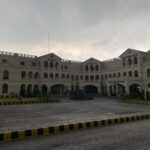UNITED NATIONS, Sep 21 (APP): The President of the United Nations Economic and Social Council (ECOSOC), Ambassador Munir Akram of Pakistan, Monday called for a collective response to the the world’s triple challenge — recovering from the coronavirus pandemic; reviving the realization of the Sustainable Development Goals (SDGs), and avoiding the looming threat of a climate catastrophe, as he underscored the need for strengthening the world body.
“The response to these challenges must be collective – No one will be safe until everyone is safe from the virus. Even as we impose isolation, we must come together,” he told a High-level meeting to commemorate the seventy-fifth anniversary of the United Nations.
“Every country – rich or poor – must be helped to defeat the virus and keep their people alive and their economies afloat,” the ECOSOC president added, speaking from the podium of the iconic Hall of the UN General Assembly with delegates observing social distancing because of the pandemic.
Pointing out that prosperity and peace are interdependent, he said it was unfortunate that even as the world confronts the common challenges of COVID-19, the SDGs and Climate change, the potential for collective action and international cooperation are being eroded by the revival of great power rivalry, old and new conflicts across the world.
“The United Nations cannot be made ‘fit for purpose’ if the Security Council is paralyzed; and if the General Assembly and ECOSOC are marginalized,” Ambassador Akram said.
“The United Nations cannot be effective if unilateral actions are preferred over multilateral solutions; it is starved of the resources to fulfill its vital mandates for peacekeeping and peace building; if the resolutions of the Security Council are flouted at will.”
The anniversary meeting was opened by the president of the 193-member Assembly, Volkan Bozkir, and followed by remarks from UN Secretary-General and the President of the Security Council, Ambassador Abdou Abarry of Niger.
The theme of the meeting is “The future we want, the United Nations we need: reaffirming our collective commitment to multilateralism.”
In his remarks, Ambassador Akram said the United Nations was established 75 years ago not only to “save succeeding generations from the scourge of war” but also to promote “better standards of life in larger freedoms”.
The fundamental principles of the Charter – sovereign equality and territorial integrity of states, non-use or threat of force, and peaceful settlement of disputes have served as the foundations of the post-1945 order, the ECOSOC chief said.
“Against all odds,” he added, “the world’s nations have avoided another global conflict.
The ECOSOC, its functional and regional commissions and the UN family of organizations have provided the framework, venue and processes for international economic, social and technological cooperation, he pointed out.
“Historically, this has been a ‘golden age’ – in economic growth and productivity; the reductions in poverty and maternal and child mortality; the rise in life expectancy; and scientific and technological advances.
But Ambassador Akram said the COVID-19 pandemic has starkly revealed the reality of inequality among and within nations.
“It is the poorest who have suffered the most from the pandemic. The richer countries have mobilized 11 trillion to respond to the COVID health and economic crisis which will contract the world economy by 5-10 percent.
“The developing countries are struggling even a small fraction fo the resources needed to keep their people alive and their economies afloat. Over a hundred million people are likely to be pushed back into extreme poverty, eroding a decade’s growth and development.
The ECOSOC president underscored the need for making available the vaccine against COVID-19 – once developed – to everyone, everywhere, at affordable price, without discrimination.
“Our response to the triple crisis must be synergetic and to contain the virus, revive sustainable growth and avoid climate catastrophe.
“And, our response must have no one behind. This will require unprecedented levels of internal cooperation. Such cooperation cannot be presented anywhere except within the UN and its family of organizations. The UN is more established today than ever before.”
Ambassador Akram called for empowering the ECOSOC to take the decisions that are needed to overcome the COVID, sustainable development and climate challenges.
During its Presidency of ECOSOC this year, he said Pakistan will focus on practical steps and concrete actions:
1. Mobilizing the requisite finances is vital to meet the triple challenge –the developing countries need at least 2.5 Trillion to recover from the health and economic challenge of the COVID crisis. The quickest solution is to create new Special Drawing Right (SDRs) of at least $600 Billion and repurpose the unutilized quotas of the richer countries. The Central Banks of reserve currency countries must initiate a loan facility that can mobilize the enormous and underutilized capital in global markets to restructure consolidate debt and generate productive investment in sustainable development.
2. An additional investment of $1.5 Trillion annually is required in sustainable infrastructure – energy, transport, water and sanitation, to achieve at least 90% of targets.
3. The application and absorption of new technologies is imperative to evolve a dynamic and sustainable development paradigm.
In this regard, the ECOSOC president stressed the Intellectual Property regime should be made compatible with the SDGs.
Research and development, he said, should be directed to achieve specific outcomes that are vital to promote the SDGs and Climate goals.
The digital economy should unite, not divide; it should promote equality, not further inequality, he said, adding that the digital divide must be bridged, the ECOSOC president added.





